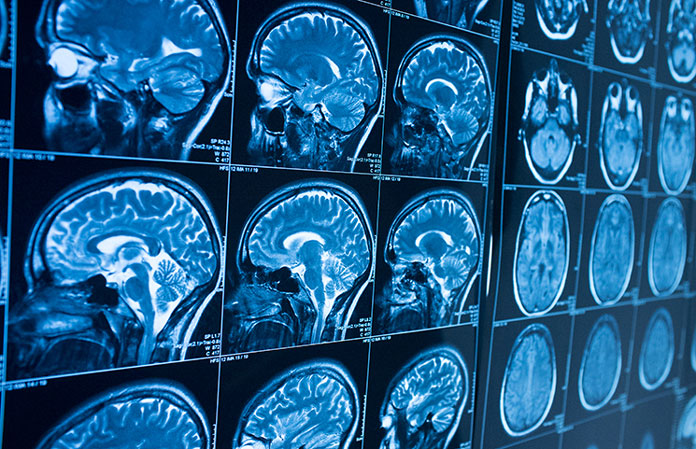America’s Defense Advanced Research Projects Agency (DARPA) has been experimenting with brain chip technology that could help treat everything from major depressive order to hand cramps.
The brain chips aren’t just a theoretical project: they’ve actively in use today. A woman in Massachusetts received two electrode implants in her brain as part of the research, and the system could receive an FDA-approved clinical trial within the next 3 years.
That woman, Liss Murphy, received two 42cm-long electrodes implanted deep within the white matter of her brain. Liss, for years, had suffered from severe depression that was not responding to conventional treatments. She had tried rounds of Effexor, Risperdal, Klonopin, Lithium, Cymbalta, Abilify, and even electroshock therapy. None helped.
Then, doctors offered a new option called deep brain stimulation.
Liss’s surgery was performed on June 6, 2006 by doctors at Massachusetts General Hospital. Doctors drilled two holes into Liss’s skull, then implanted two electrodes into a dense network of brain fibers “within her brain’s internal capsule”, explained one writeup from Gizmodo. The axons in this part of the brain carry signals to many of the brain’s circuits that have been linked with depression.

Doctors connected the electrodes to two wires that ran behind Liss’s ears and under her skin to her clavicle. There, doctors placed two battery packs just slightly larger than a matchbox. When the battery packs were turned on, doctors hoped the electrical signals would help re-wire circuits in Liss’s brain that were causing her to feel depressed.
It worked.
Liss became one of the first people in the world who was successfully treated for a psychiatric illness using deep brain stimulation.
Before the surgery, Liss claimed that her greatest hope was to die: “My greatest hope the day of the surgery was that I would die on the table.”
After the surgery, she claims to be able to lead a normal life:
“I can cobble together a regular day now. It truly gave me my life back.”
Why am I telling you the story of Liss Murphy? It’s because the same team that pioneered Liss’s surgery back in 2006 is now being funded by DARPA.
DARPA Brain Chip Implants
The team behind Liss Murphy’s surgery recently received a five year, $65 million research grant from the Defense Advanced Research Projects Agency (DARPA). The team is now halfway through the project, with the aim of using the same technology to tackle some of the world’s most treatment-resistant psychiatric disorders.
That team can be found at Mass. General and UCSF, where they’re working to develop deep brain stimulation treatments for schizophrenia, PTSD, traumatic brain injury, borderline personality disorder, anxiety, addiction, depression, and others.

Their research is changing the way we approach mental illness – including the effects that mental illness has on the brain.
Up to this point, deep brain stimulation (DBS) has mostly been used to control symptoms of Parkinson’s disease. Controlling the trembling caused by Parkinson’s is relatively straightforward compared to, say, managing depression.
There are some obvious problems: not everybody’s depression is alike, for example. Diagnosing major depressive disorder requires that a person exhibit 5 out of 9 symptoms, but that means two people could have two entirely different sets of symptoms with the same disorder. Another problem is that researchers aren’t even 100% sure which regions of the brain should be targeted to treat depression.
Then, of course, there’s the ethics problems: is it ethical to insert a chip into someone’s brain to change their circuitry? Are you changing the identity of that person? Could someone abuse this technology? Could someone hack into another person’s DBS system? There are all sorts of major hurdles to cross.
DARPA And Enhanced Super Soldiers
You don’t have to look far online to find claims that DARPA isn’t using this technology to enhance human health: they’re a defense organization, and they’re using it to build enhanced super soldiers – at least, according to certain reports online.
That theory isn’t entirely crazy. DARPA is actively engaged in other brain research, including the use of chips to restore memories and movement to battle-wounded soldiers – not to treat mental illness.
Meanwhile, a 2015 book called The Pentagon’s Brain, which explained the history of DARPA, claims that the organization is hoping to plant chips in soldiers to “unlock the secrets of artificial intelligence and allow us to give machines the kind of higher-level reasoning that humans can do”.

What Happens Next?
Where does DARPA’s brain chip project go next? The team has built an entirely new DPS unit that contains 5 electrodes with 64 points of contact. This system allows them to target the brain with a new level of precision. Electrodes in the system will gather data from the brain, process it, and then administer the appropriate dose of stimulation customized for that patient.
The project cleared another hurdle in January, when the FDA gave the Mass. General team approval to hook the system up to a patient for the first time. The team plans to test the system temporarily on the patient – at first for a few hours, then moving up to a few days.
By the end of DARPA’s 5 year contract with the team, they hope to have a device, protocol, and system ready to be tested as part of an FDA-approved clinical trial.
Ultimately, DARPA insists that it’s goal is to treat major depressive disorder – especially in soldiers and veterans with wounded brains or psychiatric issues. We’ll keep you posted about DARPA’s futuristic brain chip research as the project continues to move forward.









